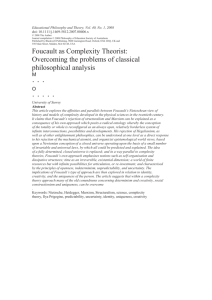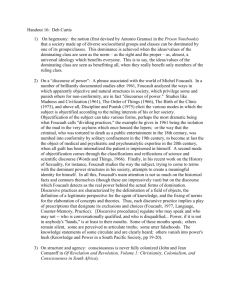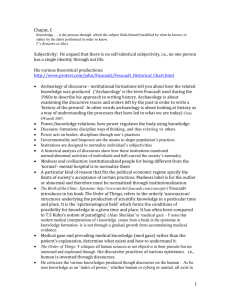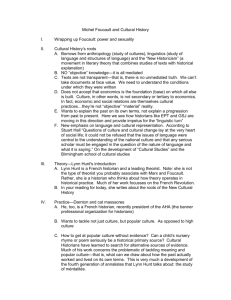m. foucault's view on power relations
advertisement
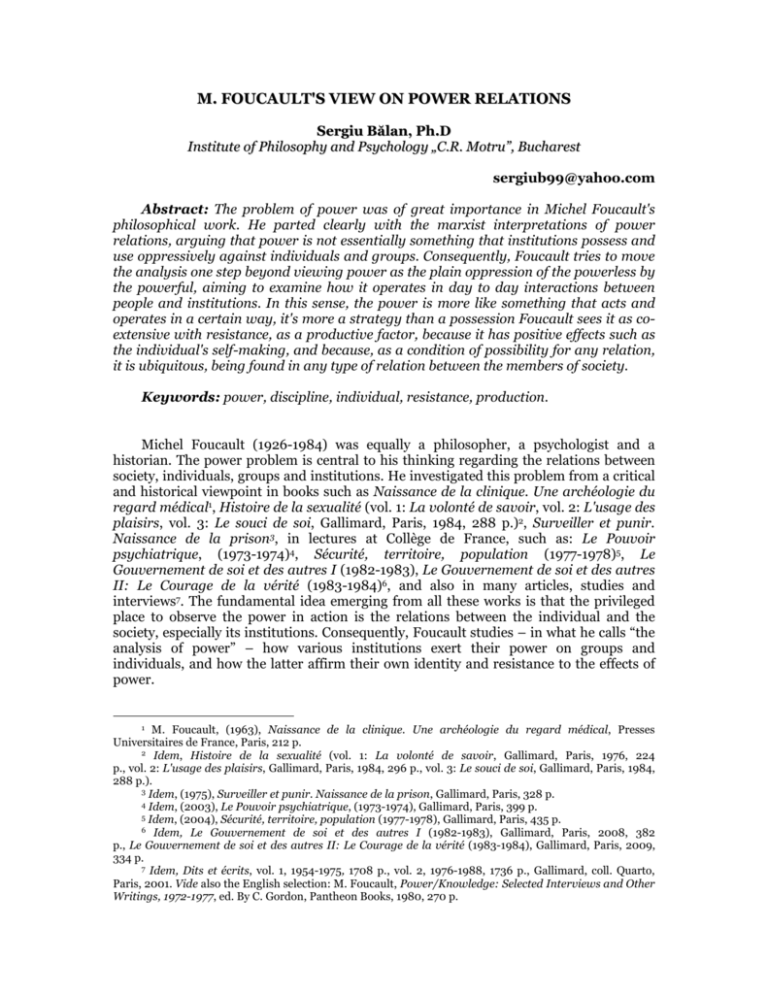
M. FOUCAULT'S VIEW ON POWER RELATIONS Sergiu Bălan, Ph.D Institute of Philosophy and Psychology „C.R. Motru”, Bucharest sergiub99@yahoo.com Abstract: The problem of power was of great importance in Michel Foucault's philosophical work. He parted clearly with the marxist interpretations of power relations, arguing that power is not essentially something that institutions possess and use oppressively against individuals and groups. Consequently, Foucault tries to move the analysis one step beyond viewing power as the plain oppression of the powerless by the powerful, aiming to examine how it operates in day to day interactions between people and institutions. In this sense, the power is more like something that acts and operates in a certain way, it's more a strategy than a possession Foucault sees it as coextensive with resistance, as a productive factor, because it has positive effects such as the individual's self-making, and because, as a condition of possibility for any relation, it is ubiquitous, being found in any type of relation between the members of society. Keywords: power, discipline, individual, resistance, production. Michel Foucault (1926-1984) was equally a philosopher, a psychologist and a historian. The power problem is central to his thinking regarding the relations between society, individuals, groups and institutions. He investigated this problem from a critical and historical viewpoint in books such as Naissance de la clinique. Une archéologie du regard médical1, Histoire de la sexualité (vol. 1: La volonté de savoir, vol. 2: L'usage des plaisirs, vol. 3: Le souci de soi, Gallimard, Paris, 1984, 288 p.)2, Surveiller et punir. Naissance de la prison3, in lectures at Collège de France, such as: Le Pouvoir psychiatrique, (1973-1974)4, Sécurité, territoire, population (1977-1978)5, Le Gouvernement de soi et des autres I (1982-1983), Le Gouvernement de soi et des autres II: Le Courage de la vérité (1983-1984)6, and also in many articles, studies and interviews7. The fundamental idea emerging from all these works is that the privileged place to observe the power in action is the relations between the individual and the society, especially its institutions. Consequently, Foucault studies – in what he calls “the analysis of power” – how various institutions exert their power on groups and individuals, and how the latter affirm their own identity and resistance to the effects of power. 1 M. Foucault, (1963), Naissance de la clinique. Une archéologie du regard médical, Presses Universitaires de France, Paris, 212 p. 2 Idem, Histoire de la sexualité (vol. 1: La volonté de savoir, Gallimard, Paris, 1976, 224 p., vol. 2: L'usage des plaisirs, Gallimard, Paris, 1984, 296 p., vol. 3: Le souci de soi, Gallimard, Paris, 1984, 288 p.). 3 Idem, (1975), Surveiller et punir. Naissance de la prison, Gallimard, Paris, 328 p. 4 Idem, (2003), Le Pouvoir psychiatrique, (1973-1974), Gallimard, Paris, 399 p. 5 Idem, (2004), Sécurité, territoire, population (1977-1978), Gallimard, Paris, 435 p. 6 Idem, Le Gouvernement de soi et des autres I (1982-1983), Gallimard, Paris, 2008, 382 p., Le Gouvernement de soi et des autres II: Le Courage de la vérité (1983-1984), Gallimard, Paris, 2009, 334 p. 7 Idem, Dits et écrits, vol. 1, 1954-1975, 1708 p., vol. 2, 1976-1988, 1736 p., Gallimard, coll. Quarto, Paris, 2001. Vide also the English selection: M. Foucault, Power/Knowledge: Selected Interviews and Other Writings, 1972-1977, ed. By C. Gordon, Pantheon Books, 1980, 270 p. Foucault thinks that it is wrong to consider power as something that the institutions possess and use oppressively against individuals and groups, so he tries to move the analysis one step beyond viewing power as the plain oppression of the powerless by the powerful, aiming to examine how it operates in day to day interactions between people and institutions. In the first volume of Histoire de la sexualité he argues that we must overcome the idea that power is oppression, because – even in their most radical form – oppressive measures are not just repression and censorship, but they are also productive, causing new behaviours to emerge. As opposed to most marxist thinkers, Foucault is concerned less with the oppressive aspect of power, but more with the resistance of those the power is exerted upon. For example, the marxist thinker Louis Althusser studied mainly how people are oppressed by the state institutions and how they build themselves as individuals through the mystifying action of the ideology8. While for Althusser individuals are just puppets of the ideological and repressive apparatus and power is seen as acting from top downwards, Foucault proposes an alternative model in which power relations dissipate through all relational structures of the society. This enables him to build a model of the daily and mundane manners in which power is exerted and contested, as well as an analysis centered on the human individual as an active subject, not as a simple object for the power. Usually, power is understood as the capacity of an agent to impose his will over the will of the powerless, or the ability to force them to do things they do not wish to do. In this sense, power is understood as possession, as something owned by those in power. But in Foucault's opinion, power is not something that can be owned, but rather something that acts and manifests itself in a certain way; it is more a strategy than a possession: „Power must be analyzed as something which circulates, or as something which only functions in the form of a chain . . . Power is employed and exercised through a netlike organization . . . Individuals are the vehicles of power, not its points of application”.9 This way of understanding power hat two key features: a) power is a system, a network of relations encompassing the whole society, rather than a relation between the oppressed and the oppressor; b) individuals are not just the objects of power, but they are the locus where the power and the resistance to it are exerted10 Mark G.E. Kelly thinks that these features can be further nuanced. In his opinion, Foucault's view of power, as presented in Surveiller et punir. Naissance de la prison, involves the following features: “1. The impersonality, or subjectlessness, of power, meaning that it is not guided by the will of individual subjects; 2. The relationality of power, meaning that power is always a case of power relations between people, as opposed to a quantum possessed by people; 3. The decentredness of power, meaning that it is not concentrated on a single individual or class; 4. The multidirectionality of power, meaning that it does not flow only from the more to the less powerful, but rather “comes from below,” even if it is nevertheless “nonegalitarian”; 5. The strategic nature of power, meaning that it has a dynamic of its own, is intentional”.11 Together with these, says Kelly, other features can be identified – but they are not present in the cited work, but in Histoire de la sexualité: power is coextensive with 8 Cf. L. Althusser, (1984), Essays on Ideology, London, Verso. M. Foucault, (1980), Power/Knowledge: Selected Interviews and Other Writings 1972–1977, London: Harvester Press, p. 98. 10 S. Mills, (2003), Michel Foucault, London, Routledge, p. 35. 11 Mark G. E. Kelly, The Political Philosophy of Michel Foucault, London, Routledge, , 2009, pp. 3738. 9 resistance12, it is productive – i.e., it causes positive effects –, and it is ubiquitous – i.e., it can be found in any type of relation between the members of society, being a possibility condition for any relation13. Conceiving power as strategy and not as possession means to think of it as something that has to be exerted and not something that can simply be acquired It is not localized exclusively in certain institutions or individuals, but it is rather a set of relations dispersed throughout society: “I am not referring to Power with a capital P, dominating and imposing its rationality upon the totality of the social body. In fact, there are power relations. They are multiple; they have different forms, they can be in play in family relations, or within an institution, or an administration”14. This view directly contradicts the marxist one, which regards power as a form of repression or oppression Foucault thinks that power must be understood differently than repression, which simply forces individuals to obey: “if power was never anything but repressive, if it never did anything but say no, do you really believe that we should manage to obey it?”15 Therefore, says Foucault, power is “coextensive with resistance; productive, producing positive effects; ubiquitous, being found in every kind of relationship, as a condition of the possibility of any kind of relationship.”16 In the first volume of Histoire de la sexualité, Foucault says that “where there is power there is resistance”17. This means that the power relations between individuals cannot be reduced to master-slave or oppressor-victim relations, but they are productive relations, because they imply resistance – without which no power relation can be conceived: where is power, there is always someone who resists it. For Foucault, the state is not mainly something that owns power, but rather something which builds a system of relations between individuals so that the political system works. In Surveiller et punir. Naissance de la prison, he reviews the ways in which power was exerted in various stages of European history and shows how the monarchic power system was replaced by the democratic one. He uses in an expressive way the punishment imagery: while the symbol of monarchic power was the public execution, that of democratic power is discipline, imprisonment away from public eyes. The meaning of this change in how outlaws are punished is a change in the power streams running through society: the public execution was the external symbol of royal power, used from top downwards (the king stood for the power of the nation), but it is replaced by democratic means of punishment, such as imprisonment, which tells that now power is exerted by the whole nation. Foucault contrasts these two ways of exerting power, helping us to understand the differences: “This new mechanism of power is more dependent upon bodies and what they do than upon the earth and its products. It is a mechanism of power which permits time and labour, rather than wealth and commodities, to be extracted from bodies. It is a type of power which is constantly exercised by means of surveillance rather than in a discontinuous manner by means of a system of levies or obligations distributed over time. It presupposes a tightly knit grid of 12 Cf. M. Foucault, An Introduction. Vol. 1 of The History of Sexuality, Translated by Robert Hurley, New York: Pantheon, 1978. Reprinted as The Will to Knowledge, London: Penguin, 1998, p. 95; M. Foucault, Power/Knowledge, Edited by Colin Gordon, Brighton: Harvester, 1980, p. 142. 13 Cf. Op. cit., p. 142. 14 M. Foucault, (1988), Critical theory/intellectual theory, interview with Gerard Raulet, in L. Kritzman (ed.), Michel Foucault: Politics, Philosophy, Culture: Interviews and Other Writings, 1977–1984, London: Routledge, p. 38. 15 M. Foucault, (1978), The History of Sexuality, translated by Robert Hurley, Vol. I, New York: Pantheon, p. 36. 16 M. G. E. Kelly, (2009), The Political Philosophy of Michel Foucault, London, Routledge, p. 38. 17 M. Foucault, (1978), The History of Sexuality, translated by Robert Hurley, Vol. I, New York: Pantheon. material coercions rather than the physical existence of a sovereign. It is ultimately dependent upon the principle, which introduces a genuinely new economy of power, that one must be able simultaneously both to increase the subjected forces and to improve the force and efficacy of that which subjects them.”18 Then, the French thinker examines how discipline, as a type of self-regulation encouraged by institutions, becomes the norm in modern societies and acts as for the individual as an instrument to change the reality and himself: “We must cease once and for all to describe the effects of power in negative terms: it “excludes”, it “represses”, it “censors”, it “abstracts”, it “masks”, it “conceals”. In fact, power produces; it produces reality; it produces domains of objects and rituals of truth”19. The institutions use various types of power enforcement, with specific mechanisms and techniques: Foucault shows how the hospital, the clinic, the prison and the university share some of these disciplinary techniques and practices. Discipline is a concern for control internalized by every individual, referring to temporal bench-marks, bodily posture and functions, sublimation of wishes and immediate emotions. All these are effects of the disciplinary pressure, but are also actions that, through pressure initially imposed externally, lead to self-discipline for the individual and eventually to the production of the individual himself as a subject. „The most significant feature of Foucault’s thesis is his stress on the productive nature of power’s modern exercise. His main aim was to turn a negative conception upside down and attribute the production of concepts, ideas, and the structures of institutions to the circulation and exercise of power in its modern forms.”20 For Foucault, discipline is a set of strategies, procedures and behaviours associated with certain institutional contexts which then pervades the individual's general thinking and behaviour. It acts in four specific ways.21 Firstly, through certain spatial disposition of individuals, which is usually attained through imprisonment. The prisoner is separated from his mates by being incarcerated in an isolated room (the same is valid for patients of psychiatric clinics). This spatial distribution may be obtained in society by other means also, such as individuals' segregation into heterogeneous groups (e.g., students separated from workers), placing individuals and machinery in separate rooms, as indicated by the architecture plan of a factory or by hierarchical relations (soldiers and officers live in separate rooms). Subjected to such treatments, individuals come to “know their place” in the context of the general economy of space associated with the disciplinary power. Secondly, discipline acts through controlling activities. A specific tendency of the disciplinary power is to use the individual's body to get “time and work”, rather than “wealth and goods”. Time is “extracted” from the body through strict control of its activities, with the help of a strict daily schedule, by adjusting its movements to a series of temporal stages, through correlation of postures and bodily movements (e.g., the calligraphic writing) or through synchronizing the body moves with those of an object (as in military instruction with a weapon). Thirdly, discipline is about organizing stages of education, especially in pedagogical practices. The disciplinary power develops a general code of relations between master and disciple in various teaching areas, which encodes the segments of teaching in hierarchical stages, each stage more complex and difficult than the preceding one. This allows efficient monitoring of the progress in acquiring the desired abilities, and also allows differentiation between individuals who are more or less skilled. Fourthly, discipline brings into effect a general coordination of 18 M. Foucault, (1980), Power/Knowledge: Selected Interviews and Other Writings 1972–1977, London: Harvester Press, p.104. 19 M. Foucault, (1977), Discipline and Punish: The Birth of the Prison, London: Allen Lane, p. 194 20 A. McHoul, W. Grace, (1993), A Foucault Primer. Discourse, Power and the Subject, London, Routledge, p. 64. 21 Ibidem, pp. 69-70. all the parts of a system: the educational procedures regarding the individual's body are integrated into a larger mechanism, the chronological series are also part of this mechanism and there is a precise set of commands. For setting up this coordination, discipline uses what Foucault calls “tactics”, through which “the product of the various forces is increased by their calculated combination”.22 The intention behind these methods is to produce regularity, but Foucault shows that the effect is just the opposite: building the individual's self through internal discipline leads to different identities. Individuality is a modern creation, as well as the claim, supposedly liberating, that society acknowledges individuality and difference. This is an unintended, even unwanted effect of the initial disciplinary project: “The individual is not to be conceived as a sort of elementary nucleus, a primitive atom, a multiple and inert material on which power comes to fasten or against which it happens to strike, and in so doing subdues or crushes individuals. In fact, it is already one of the prime effects of power that certain bodies, certain gestures, certain discourses, certain desires, come to be identified and constituted as individuals. The individual, that is, is not the vis-à-vis of power; it is, I believe, one of its prime effects.”23 The disciplinary structure described by Foucault (as well as by other thinkers who talked about power) is the panopticon, an architectural structure revealed by Jeremy Bentham as a way to arrange prisoners so that each of them can be observed by the warden, without the warden being visible to them and with no interaction between prisoners. Foucault describes this in an interview suggestively named The Eye of Power: “A perimeter building in the form of a ring. At the centre of this a tower, pierced by large windows opening on to the inner face of the ring. The outer building is divided into cells each of which traverses the whole thickness of the building. These cells have two windows, one opening onto the inside, facing the windows of the central tower, the other, outer one allowing daylight to pass through the whole cell. All that is then needed is to put an overseer in the tower and place in each of the cells a lunatic, a patient, a convict, a worker or a schoolboy. The back lighting enables one to pick out from the central tower the little captive silhouettes in the ring of cells. In short the principle of the dungeon is reversed; daylight and the overseer’s gaze captures the inmate more effectively than darkness, which afforded after all a sort of protection.”24 This special spatial arrangement means exposing the individual to maximum visibility, which brings up a new form of internalized disciplinary practice: the person is forced to behave as if someone is permanently watching, even if this is not necessarily the case. The individual in the panopticon is forced to internalize the disciplinary “gaze” (le regard) so that “[s/]he who is subjected to a field of visibility and who knows it, assumes responsibility for the constraints of power; [s/]he makes them play spontaneously upon [her/]himself; [s/]he inscribes in [her/]himself the power relation in which [s/]he simultaneously plays both roles; [s/]he becomes the principle of [her/]his own subjection”25. Thus a new form of power is being born: instead of the power being enforced directly upon the body of the victim by the owner of authority, now the individual himself plays both roles, and the oppressor may well be absent, because the prisoner has internalized so well the imposed behavioural code, that he behaves as if the oppressor were always present. 22 M. Foucault, (1977), Discipline and Punish: The Birth of the Prison, London: Allen Lane, p. 167. M. Foucault, (1980), Power/Knowledge: Selected Interviews and Other Writings 1972–1977, London, Harvester Press, p. 98. 24 M. Foucault, The Eye of Power, in C. Gordon (ed.), Power/Knowledge, Brighton: Harvester, pp. 147–165. 25 M. Foucault, (1991), Discipline and Punish: The Birth of the Prison, Harmondsworth, Penguin, pp. 202-203. 23 Regarding the political power, Foucault studies especially power relations related to government (for which he uses the concept of gouvernementalité, from gouverner and mentalité), asking who can and should govern, who is to be governed, and how should we conceive the methods of government, i.e. the methods of shaping others' behaviour. Fundamentally, he thinks that political power relations are doomed to fail in reaching their goals: most frequently they don't reach their final goal of absolute domination, and that is another reason not to consider power relations negative and constraining: “If power is relational rather than emanating from a particular site such as the government or the police; if it is diffused throughout all social relations rather than being imposed from above; if it is unstable and in need of constant repetition to maintain; if it is productive as well as being repressive, then it is difficult to see power relations as simply negative and as constraining.”26 In his analysis of “governmentality”, Foucault stresses again that it would be an error to understand institutions such as the state as being essentially oppressive (as marxists do) and as being permanent and solid – which they are not, but just the opposite is true: they are fragile and have a great potential of change: “Overvaluing the problem of the state is one which is paradoxical because apparently reductionist: it is a form of analysis that consists in reducing the state to a certain number of functions, such as the development of productive forces of the reproduction of relations of production, and yet this reductionist vision of the relative importance of the state’s role nevertheless invariably renders it absolutely essential as a target needing to be attacked and a privileged position needing to be occupied. But the state, no more probably than at any other time in its history, does not have this unity, this individuality, this rigorous functionality, nor to speak frankly, this importance: maybe after all, the state is no more than a composite reality and a mythicised abstraction, whose importance is a lot more limited than many of us think.”27 So for Foucault the state is not a super-human agent, having will and intentions analogue to those of people. This doesn't mean we should give up the notion of state, but we should go beyond it when analyzing power relations: “the State, for all the omnipotence of its apparatuses, is far from being able to occupy the whole field of actual power relations.”28 Relations between parents and children, between lovers, between employers and employees – all are power relations. In every human interaction, power is subject to negotiation, each individual having his place in the hierarchy, no matter how flexible would it be. In conclusion, Foucault analyses the relations between individuals and society without assuming that the individual is powerless compared to institutions, groups or the state. He doesn't minimize the restrictions imposed to individuals, but thinks that power is not concentrated, but diffuse throughout the whole society. This allows us to see it at work in each human interaction and thus to see how resistance always shows up. Power is seen as a more volatile, unstable element, which can be always contested, so power relations must be permanently renewed and reaffirmed. 26 S. Mills, (2003), Michel Foucault, London, Routledge, p. 47. M. Foucault, Governmentality, in G. Burchell, C. Gordon, and P. Miller (eds), The Foucault Effect: Studies in Governmentality, Chicago, University of Chicago Press, pp. 85–103. 28 M. Foucault, Truth and power, in C. Gordon (ed.), Power/Knowledge, Brighton: Harvester, pp. 107–133. 27

